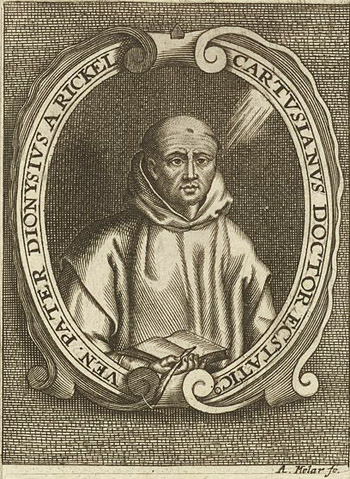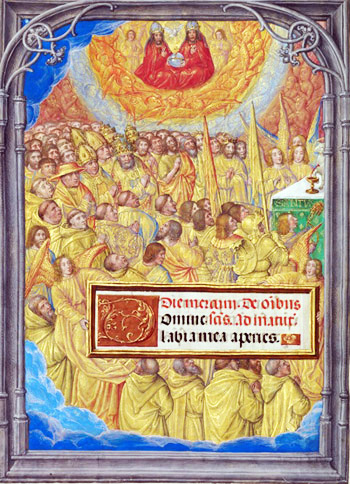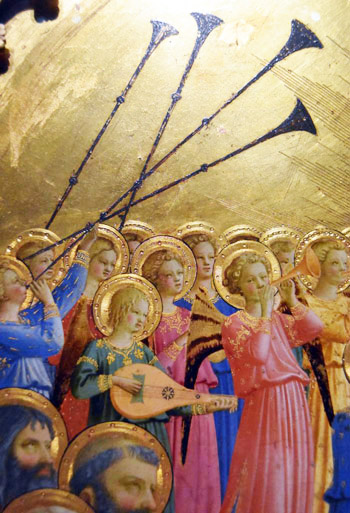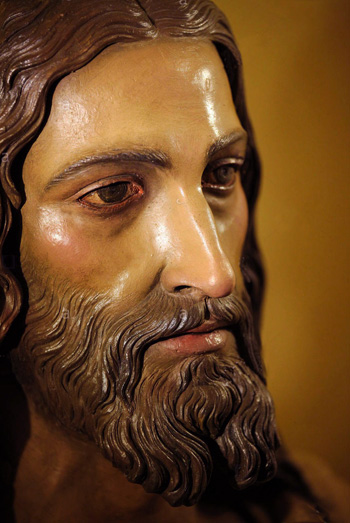Excerpt by Blessed Denis (1402-1471):
Beatitude and the reward of the Saints in Heaven consist in the clear, immediate knowledge of the Divinity and the full happiness it brings. In this vision a person sees together the entire Holy Trinity with his sight full of glory because the Father, the Son and the Holy Ghost are one only essence, the one same God, the same sovereign good that the person enjoys.

Blessed Denis (1402-1471)
In effect, the more a thing is superior in effect and excellence, the more we feel the happiness of clearly possessing it, above all if we love its presence and fervently desire it. Now, God is the infinite beauty. Or, better said: by His essence He is invariable beauty; moreover, He is beauty that never ends, most pure, brilliant, complete and agreeable; the original beauty whence comes all the beauty of the creatures – all infinitely far from His – emanating as from a fountain.
The more a thing is superior to us in beauty and excellence, the more we feel the joy of definitively possessing it.
What is more beautiful than the truth? God is truth itself. What is more pure than sanctity? God is sanctity itself. What is more luminous than wisdom? God is wisdom itself.
God is the first truth that subsists of itself, the eternal sanctity that never ends and the fountain of wisdom that cannot be measured or dimmed in its effusion. He is, therefore, truly, essentially and incomparably beautiful and most amiable in Himself.
We also say that the Saints in the Celestial Kingdom love God most ardently. This is why they contemplate Him, as in a delirium of inexpressible joy, all the greater since they no longer desire anything else.
It is certain that when we see goodness, perfection and sweetness in a person, we appreciate him more. Now, God is the sovereign goodness, the immense sweetness and the complete perfection; He is all treasures, all richness and all delights joined together in an infinite degree.
Then, what delight in possessing this infinite joy, this divine goodness, enjoying them through the clear knowledge of the beatific vision! Doubtless this is the sweetest and most joyous banquet! It is the sacred banquet where the Divinity and the Eternal Trinity become food for men!
Comments of Prof. Plinio:
The Saints know God with all clarity and immediately, that is, not through an image, idea or other intermediary thing, but straightforwardly. This knowledge is delightful; it is a thing that fills the Saints with pleasure.

The Saints in Heaven enjoy the Beatific Vision
He who contemplates the essence of God sees in the same gaze the Father, the Son and the Holy Ghost because They constitute the One and Triune essence of God. This knowledge is the delight of all delights, the joy of all joys.
To explain why the Saints have this enormous joy in the contemplation of God face-to-face, Blessed Denis uses a very profound principle that can be verified by our own immediate experience.
For example, each one of you who sees this table in front of me, considers how beautiful its feet are, how its wood is solid and good, and how it fulfills its final end has a sensation of enjoyment. It is because of the general principle that Blessed Denis enunciates: “The more a thing is superior to us in beauty and excellence, the greater is the joy we feel in possessing it directly.”
If someone comes to us and says: “Look, behind that screen there is a marvelous stone that shines with a unique brilliance, exuding marvelous lights, etc.” When he pauses in his eulogy, we normally would say to him: “Why do you not just remove this screen and let us see the stone directly?”
This is a natural reaction, for the contemplation of something very superior in beauty attracts our curiosity, our desire to know it directly, and when we know it, we are filled with a great sense of well-being in our soul.

Angels trumpet the glory of the Divine Trinity
At a certain point Blessed Denis the Carthusian says that the Saints have a kind of delirium of joy. The delirium he speaks of here is not the earthly state of a man who has a fever, becomes semi-crazy and enters into a delirium saying things that make no sense. There is no disorder in the delirium of which he speaks.
Man has in his nature a tendency toward the plenitude of happiness. He desires a happiness that is, so to speak, greater than himself, that fills him completely with joy and brings him to the very height of his enthusiasm.
This sort of insatiability makes us always desire more, always more, without ever stopping. We shall satisfy this insatiability and have this joy without end when we shall see God face-to-face. It is a kind of apotheosis of admiration and enthusiasm, without tedium and always restful, that we will have for all eternity. What tires in enthusiasm is the stress it brings. What tires in rest is its lack of enthusiasm. This is part of our human weakness.
In this valley of tears what is grand raises our enthusiasm and then tires us. God created the small beautiful things to make us admire them when we are tired of the grand. It is the delight of the small thing that allows us not to lose the taste for the marvelous. So, among the flowers, we have the grandiose and solemn rose and the splendorous and exotic orchid; but then we have the forget-me-not to rest us. “What a beautiful small little thing,” we say.

An excellent exercise: to consider the gaze of Our Lord Jesus Christ
In our human state there is an opposition between enthusiasm and rest. But in contemplating God, we will be perpetually at the very height of our enthusiasm and the summit of our rest. Blessed Denis then goes on to describe the infinite goodness, sweetness and perfection that are in God.
For us to make a good meditation, we should not to think only on God the Father, but also on Our Lord Jesus Christ, and try to imagine, based on the Holy Shroud of Turin, how He had all these qualities. If we could look at Him in His humanity, His divinity would reveal itself. In a certain way, we could see all these qualities in Him.
For example, a thing that I like to imagine is the many gazes of Our Lord. I would like to know His gazes: He returns home after a journey and looks at Our Lady. What would that gaze be? What would be His gaze as a boy looking at Her to express something without speaking? His gaze at St. John when the Apostle rested his head over His chest? His gaze at the Apostles sleeping at the Garden of Gethsemane? His final gaze from the Cross? His gaze after He resurrected? His last gaze at men before His ascension into Heaven.
I have the impression that if Our Lord were to condescend to gaze at us, it would be such a great delight for our souls that we would want to spend all eternity contemplating those eyes. Nothing else would be necessary. If we could know those gazes it would not be the beatific vision, but it would be the most accessible idea of the beatific vision we could have.
I suggest that you think about the gazes of Our Lord.

 | |
The texts of both the biographical data and the comments come from personal notes taken by Atila S. Guimarães from 1964 to 1995. Given the fact that the source is a personal notebook, it is possible that at times the biographic notes transcribed here will not rigorously follow the original text read by Prof. Plinio. The commentaries have also been adapted and translated for TIA’s site.



No comments:
Post a Comment